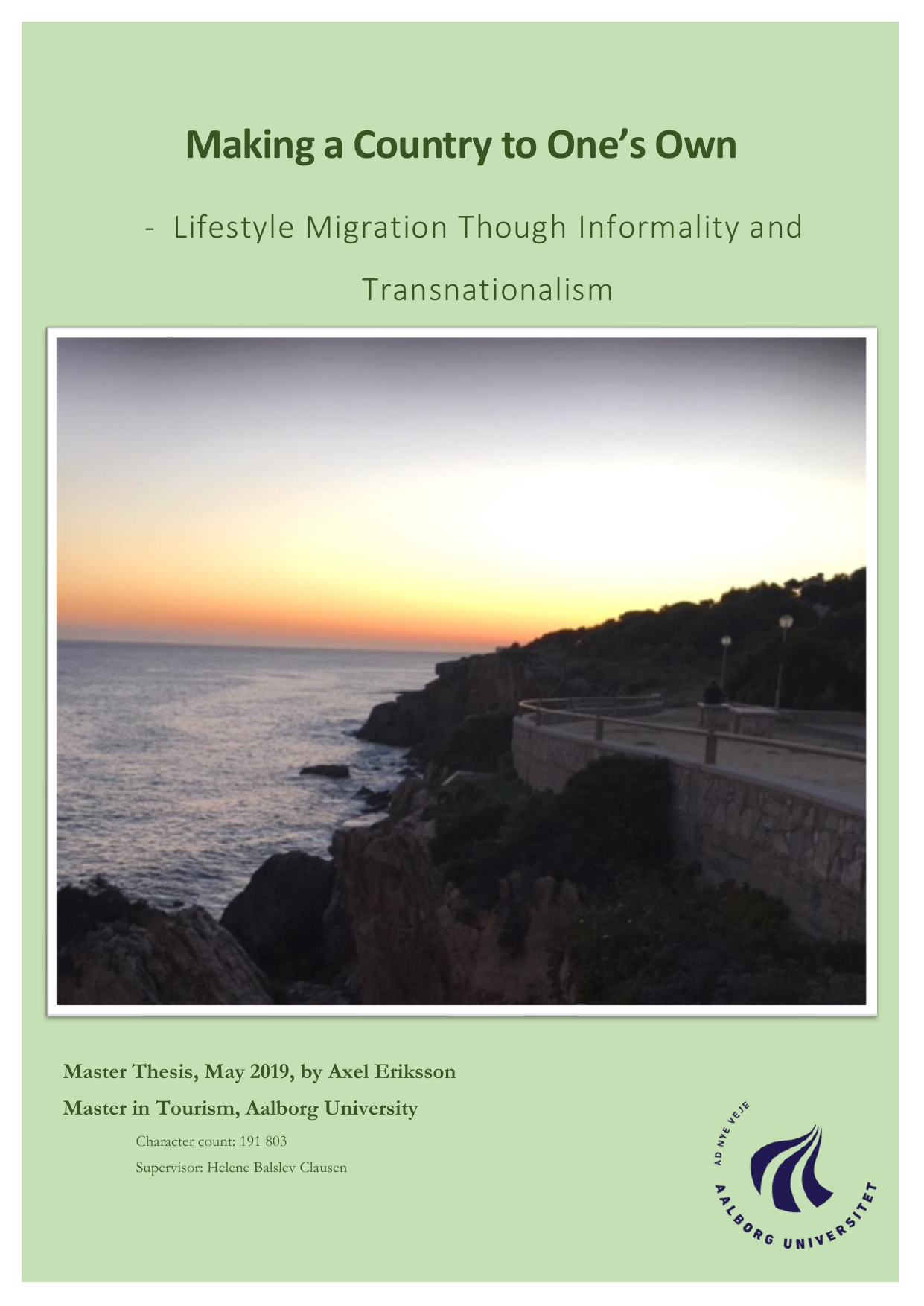
Making a country to one's own: Lifestyle Migration Though Informality and Transnationalism
Author
Term
4. term
Education
Publication year
2019
Submitted on
2019-06-03
Pages
86
Abstract
This master thesis aims to juxtaposes two disperse concepts: lifestyle migration and informality. In a case study around the Lisbon and suburban areas, the focus directs on lifestyle migrants from northern Europe migrated to south to Portugal for an escape to a better quality of life, away from cold to a place fit them best. The literature review examines lifestyle migration critically through three correspondent concept fields; the power of mobility, transnationalism and socioculturaleconomical essential variables to revise a wished or a specific lifestyle. It gives a critique of the literature on how it is presenting lifestyle migrants in research. With empirical qualitative methods, the subject entering lifestyle migration from the angle of tourism expands it into mobility where it critically excavates of lifestyle migrants within Europe with the concept of informality. In-depth interviews, together with casual conversations with various groups, hold up the methodological groundwork on the empirical data. Moreover, the thesis shed light on informality, a field which recently becomes an emerging study within tourism expands it by examining new angles to receive a wished lifestyle. The analysis takes new insights of the field of how project informality, not only to be an advantage for the lifestyle migrants and informality but it will highlight informality to be an illegal mare tool or an escape from poverty. A dialectic view of the migrants exist which show how power constitutes within directed policies by nations on the one hand, and established systems the other hand both, which will willingly and unwillingly keep lifestyle migrants’ attached strings with both countries. For some, nation-state aid by citizenship and hypermobility empower one’s life that fits better personal preference. However, it is also shown that the transnationalism of lifestyle migration also changes one’s perspective of both the country of origin and the new host country. At first, it was an aspiration being away from cold and darkness, but afterwards, some even might antagonise their nation of origin. The conclusion shows a possibility to include or exclude social and cultural barriers but might not fully grow into an integrated part of the society because of a lack of formal rights. However, constituted by mobility, they gain power through their status as lifestyle incentivised by the nationstate policies.
This master thesis aims to juxtaposes two disperse concepts: lifestyle migration and informality. In a case study around the Lisbon and suburban areas, the focus directs on lifestyle migrants from northern Europe migrated to south to Portugal for an escape to a better quality of life, away from cold to a place fit them best. The literature review examines lifestyle migration critically through three correspondent concept fields; the power of mobility, transnationalism and socioculturaleconomical essential variables to revise a wished or a specific lifestyle. It gives a critique of the literature on how it is presenting lifestyle migrants in research. With empirical qualitative methods, the subject entering lifestyle migration from the angle of tourism expands it into mobility where it critically excavates of lifestyle migrants within Europe with the concept of informality. In-depth interviews, together with casual conversations with various groups, hold up the methodological groundwork on the empirical data. Moreover, the thesis shed light on informality, a field which recently becomes an emerging study within tourism expands it by examining new angles to receive a wished lifestyle. The analysis takes new insights of the field of how project informality, not only to be an advantage for the lifestyle migrants and informality but it will highlight informality to be an illegal mare tool or an escape from poverty. A dialectic view of the migrants exist which show how power constitutes within directed policies by nations on the one hand, and established systems the other hand both, which will willingly and unwillingly keep lifestyle migrants’ attached strings with both countries. For some, nation-state aid by citizenship and hypermobility empower one’s life that fits better personal preference. However, it is also shown that the transnationalism of lifestyle migration also changes one’s perspective of both the country of origin and the new host country. At first, it was an aspiration being away from cold and darkness, but afterwards, some even might antagonise their nation of origin. The conclusion shows a possibility to include or exclude social and cultural barriers but might not fully grow into an integrated part of the society because of a lack of formal rights. However, constituted by mobility, they gain power through their status as lifestyle incentivised by the nationstate policies.
Keywords
Documents
